|
 Happy New Year!
Happy New Year!
|
January 2003 |
Contents:
|

|
We
mourn the passing of:
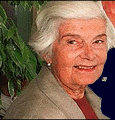 Mary
Wesley (Mary Aline Mynars Siepmann)
who has died at her home in Totnes, Devon, December 30 2002,
aged 90. She amazed the literary world by having her first novel,
Jumping The Queue, published when she was 70, in 1983. She went on to write nine
more, most notably The Camomile Lawn, figured regularly in the bestseller
lists and was appointed CBE in 1995. Mary
Wesley (Mary Aline Mynars Siepmann)
who has died at her home in Totnes, Devon, December 30 2002,
aged 90. She amazed the literary world by having her first novel,
Jumping The Queue, published when she was 70, in 1983. She went on to write nine
more, most notably The Camomile Lawn, figured regularly in the bestseller
lists and was appointed CBE in 1995.
|
|
|
Recent Literary Honours
Prize-winning author William Trevor has received an honorary knighthood in
recognition of his services to literature. The Irish author
received the honorary KBE from Culture Secretary Tessa Jowell on Wednesday.
New Years Honours
List
Novelist and biographer Peter Ackroyd becomes a CBE after the success of his
800-page London: The Biography.
Among many others, he has also written biographies of Ezra Pound, Charles
Dickens and Thomas More.
Writer Anthony Buckeridge, who created the hugely popular Jennings books for
boys in the 1950s, is awarded an OBE at the age of 90. 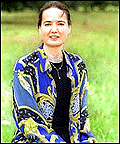 Poet Jo Shapcott, who became the first person to have won the National
Poetry
Competition twice, the second time in 1991 with her acclaimed poem Phrase Book,
becomes a CBE. Poet Jo Shapcott, who became the first person to have won the National
Poetry
Competition twice, the second time in 1991 with her acclaimed poem Phrase Book,
becomes a CBE.
|
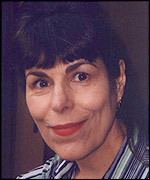 Bad Sex in Fiction Award Bad Sex in Fiction Award
Author Wendy Perriam has won one of the least coveted prizes
in literature - the Bad Sex in Fiction Award.
The annual award is organised by the Literary Review, and was founded by the
literary critics Rhoda Koenig and the late Auberon Waugh in 1993.
The prize recognises writers of the worst descriptions of a sex act in a
contemporary novel and it was third time "lucky" for the author who has the misfortune of being
nominated three times in row, this time for her novel Tread Softly which the judges at the Literary Review deemed the worst
offender for writing about love-making.
Some of the biggest names in literature had been nominated for the title
including Will Self, Nicholas Coleridge, Ethan
Hawke, Michael Faber and Hari Kunzru.
|
|
Feature
article from Alba Books
Bookselling in the
Scottish Highlands
|
|
I suspect that most people living in England and a great many in Scotland have little awareness of what lies beyond Edinburgh and Glasgow, never mind beyond Stirling, Perth, and Dundee. Even beyond Aberdeen to the north and west only after a drive of nearly 300 miles do you reach the northern tip of the country. This great swathe of land (the area covered by the Highland Council alone is the size of Belgium with a population only a fraction in excess of 200,000) has a handful of small towns, mostly in the east, one, very new and quite small, city and a scattered rural population. In such territory how do sellers of second-hand books get by. The answer, for the most part, is, tenuously. Inverness (created a city for the Millennium), through which practically every visitor to the Highlands passes and which has a population of around 50,000, has grown rapidly over the past decade or so. Here in a converted church just off the city centre, is Leakey’s, a long-established dealer with a large general stock and a coffee shop in superb premises. It has never seriously been challenged as the premier bookdealer in the north and probably the only one to enjoy the kind of footfall common in the more populous areas in the south and in England.
|
|
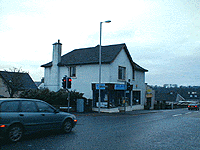 North and west of Inverness, in the Highlands proper, bookshops are few and far between. There is one in the far north, in Thurso, and another, closer to Inverness, in Dingwall. Curiously, there appear to be very few dealers in the Highlands working from home and selling by mail order either via the Internet or by catalogue. Politicians and others charged with the economic regeneration of the area have loudly trumpeted the benefits that new technology would bring. It seems to have had very little effect on our business here and my guess is that the introduction of broadband will not make much difference either. It might be an interesting exercise to compare the north of Scotland with a rural part of England, like Cornwall, which has a similar population, though in a much smaller area, but sustains a much greater number of dealers in second-hand books, including those with shops. North and west of Inverness, in the Highlands proper, bookshops are few and far between. There is one in the far north, in Thurso, and another, closer to Inverness, in Dingwall. Curiously, there appear to be very few dealers in the Highlands working from home and selling by mail order either via the Internet or by catalogue. Politicians and others charged with the economic regeneration of the area have loudly trumpeted the benefits that new technology would bring. It seems to have had very little effect on our business here and my guess is that the introduction of broadband will not make much difference either. It might be an interesting exercise to compare the north of Scotland with a rural part of England, like Cornwall, which has a similar population, though in a much smaller area, but sustains a much greater number of dealers in second-hand books, including those with shops.
|
|
From Inverness to Aberdeen a journey of just over a hundred miles takes you through mostly rural, mostly agricultural, country with small towns at fairly regular intervals. Some of these do support second-hand bookshops, although for the most part, only just. From a mood of cautious optimism two or three years ago with some considering expansion, the climate is now much gloomier. The longest-established shop in the area, the Dufftown Bookshop, closed its doors in the summer. Others are finding trading conditions generally harder, being obliged to find additional sources of income just to stay afloat.
|
|
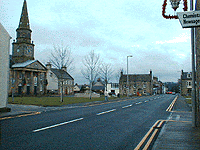 Here again fewer dealers than one might expect have taken to using the Internet to sell their wares, curious, since such a move would surely compensate for the lack of customers coming in through the door. A quick look at ABE, for example, shows that in the whole vast area north and west of Aberdeen the number selling electronically can be counted on scarcely more than the fingers of two hands. Of these only a very few have shops, a very few more are established dealers in specialist subject areas and there will also be, no doubt, a number of dabblers. Only Grampian Books, Alba Books and The Moray Bookshop have sizeable stocks with only the latter pair having open shops. Here again fewer dealers than one might expect have taken to using the Internet to sell their wares, curious, since such a move would surely compensate for the lack of customers coming in through the door. A quick look at ABE, for example, shows that in the whole vast area north and west of Aberdeen the number selling electronically can be counted on scarcely more than the fingers of two hands. Of these only a very few have shops, a very few more are established dealers in specialist subject areas and there will also be, no doubt, a number of dabblers. Only Grampian Books, Alba Books and The Moray Bookshop have sizeable stocks with only the latter pair having open shops.
|
|
Apart from the small numbers of people the other problem is distance. Potential buyers are unlikely to be persuaded to travel fifty miles or so from one small bookshop to another in the hope of finding what they’re looking for. Whether a ‘book town’ in the area is possible is very debatable. Nevertheless a handful of bookshops in the same small town along with, perhaps, others selling antiques and collectibles, would surely be attractive enough to persuade customers to travel the long distances that those who live and do business here are used to.
|
|
|
Book Fair
10.00am - 3.30pm, Sunday 26th January 2003
at Dorking Halls, Reigate Road,
Dorking, Surrey - There will be a charge of 70p Adults, Children Free
- Second-hand and antiquarian books and other printed material.
For further details contact Simon McArthur on: 01372 725075
|
|
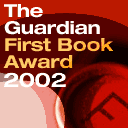 The £10,000 Guardian First Book Award has been
won by Jonathan Safran Foer's funny, touching and baroque novel Everything Is
Illuminated, about a young American Jew's journey to the Ukraine to find the
woman who saved his grandfather from the Nazis. The £10,000 Guardian First Book Award has been
won by Jonathan Safran Foer's funny, touching and baroque novel Everything Is
Illuminated, about a young American Jew's journey to the Ukraine to find the
woman who saved his grandfather from the Nazis.
The judges, who included the novelists Irvine Welsh and Kate Atkinson, were
wowed by the elan with which Safran Foer turned the familiar story of the
pilgrimage many Jews make to find what is left of their pre-Holocaust ancestral
homes in eastern Europe into something altogether new and challenging.
Safran Foer won the prize ahead of
Oliver Morton's 'Mapping Mars', Sandra Newman's 'The Only Good Thing Anyone Has
Ever Done', Alexandra Fuller's 'Don't Let's Go
to the Dogs Tonight' and Hari Kunzru's 'The
Impressionist'.
Claire Armitstead, the chairman of judges and the Guardian's literary
editor, said: "Safran Foer's debut is an incredible achievement. At just 25 he
produced a brilliantly original work that explores the very nature of 'the
novel'. He is one of the most exciting writers of his generation and has the
potential to go on to even greater things." Another of the panel, the
broadcaster Mark Lawson, said Everything Is Illuminated was "a genuine thrill to
read".
|
The 2002
Whitbread Prize, which is now in its 31st year, is divided into five
categories - novel, first novel, biography, poetry and children's book, with
each winner receiving £5,000 and category winners will be announced on 8 January
2003. Winner of the overall prize - the £25,000 Whitbread Book of the Year - will
be announced on 28 January 2003.
The Whitbread Book Award
|
Novel Award shortlist
White Lightning - Justin Cartwright
Spies - Michael Frayn
Rumours of a Hurricane - Tim Lott
The Story of Lucy Gault - William Trevor |
First Novel Award shortlist
The End of My Tether - Neil Astley
Homage to a Firing Squad - Tariq Goddard
The Impressionist - Hari Kunzru
The Song of Names - Norman Lebrecht |
|
Poetry Award shortlist
Something for the Ghosts - David Constantine
The Ice Age - Paul Farley
Voodoo Shop - Ruth Padel
The Beautiful Lie - Sheenagh Pugh |
Biography Award shortlist
Anthony Blunt: His Lives - Miranda Carter
Rosalind Franklin: The Dark Lady of DNA - Brenda Maddox
The Real Mrs Miniver - Ysenda Maxtone Graham
Samuel Pepys: The Unequalled Self - Claire Tomalin |
|
Children's Book Award shortlist
Exodus - Julie Bertagna
Saffy's Angel - Hilary McKay
Sorceress - Celia Rees
Mortal Engines - Philip Reeve |
|
|
|
 The largest known paper cutting made by Hans Christian
Andersen has been sold at auction in his Danish homeland for 520,000 kroner
(£44,580) to a museum dedicated to the writer. The cutting, which is thought to have been made in 1864, was mounted
on cloth and inserted into
one of the fairy tale author's first editions. The largest known paper cutting made by Hans Christian
Andersen has been sold at auction in his Danish homeland for 520,000 kroner
(£44,580) to a museum dedicated to the writer. The cutting, which is thought to have been made in 1864, was mounted
on cloth and inserted into
one of the fairy tale author's first editions.
Andersen often made elaborate paper cuttings to give to friends and families.
The cutting, which measures 42cm by 34cm, was made to raise money for the
victims of the Danish-Prussian war, and includes a handwritten verse written to
the original buyer. The cutting will go on display in the Hans Christian
Andersen Museum which is due to open in 2005. |
|
Next Month:
In
February 2003 the featured article will be by Plurabelle Books |
|
home
| search
| about
| members
| links
| news
| help
|

